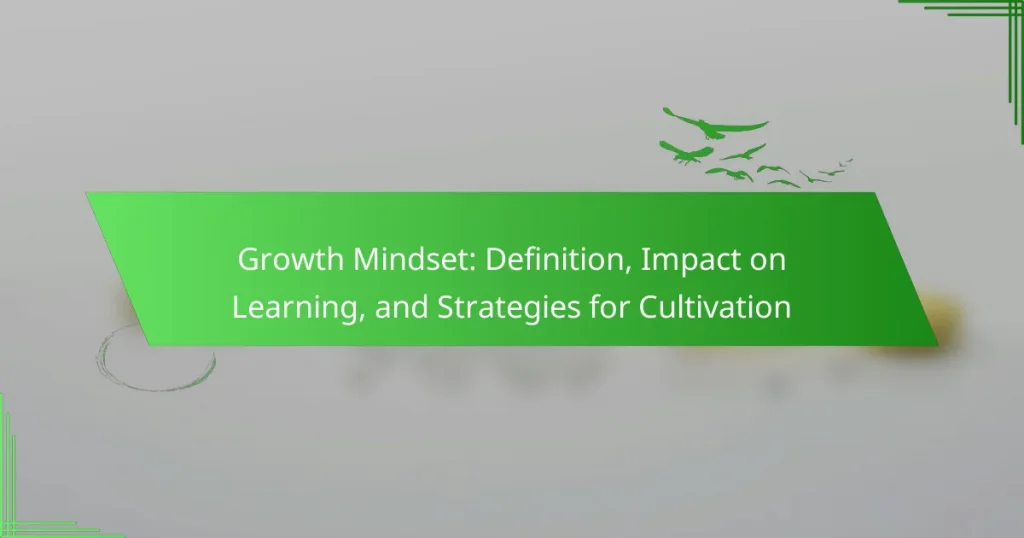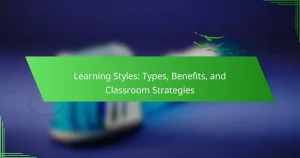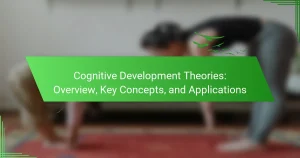A growth mindset enhances resilience and fosters a passion for learning. This article explores its definition, examines its impact on learning, and outlines effective strategies for cultivation. Understanding how to embrace challenges and seek feedback can significantly improve personal and professional development. By adopting a growth mindset, individuals can achieve higher performance and innovation in various settings.
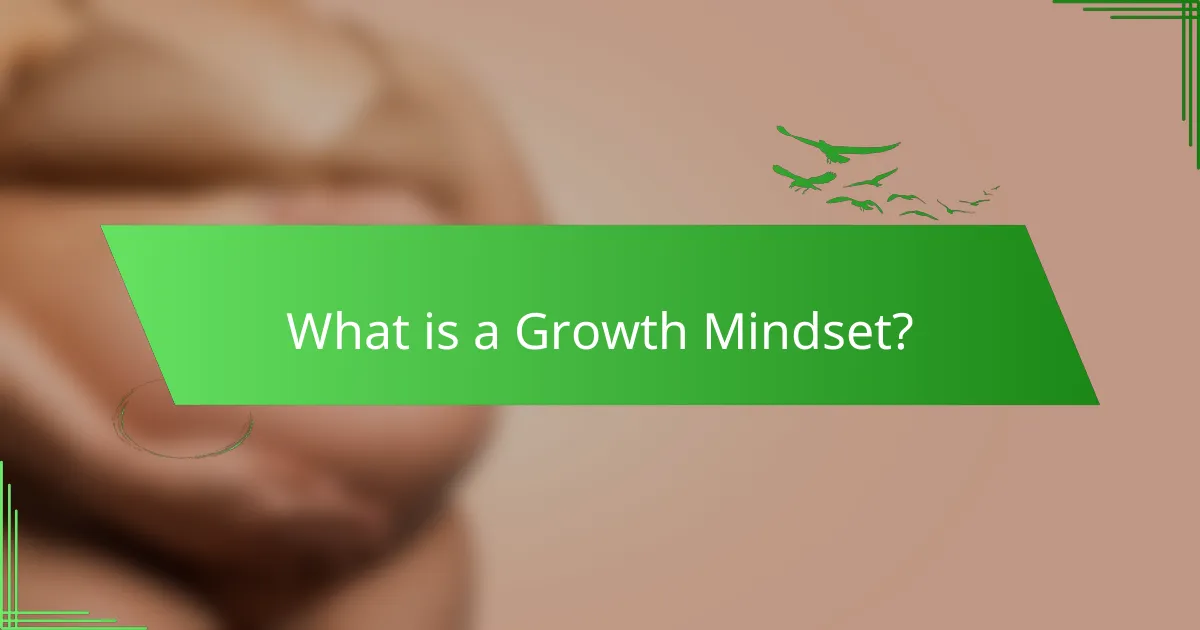
What is a Growth Mindset?
A growth mindset is the belief that abilities and intelligence can be developed through dedication and hard work. This perspective fosters resilience, enhances learning, and encourages a love for challenges. Individuals with a growth mindset are more likely to embrace feedback and view failures as opportunities for growth. Strategies for cultivating a growth mindset include setting learning goals, seeking constructive criticism, and reflecting on experiences to identify areas for improvement.
How does a Growth Mindset differ from a Fixed Mindset?
A growth mindset embraces challenges and views failure as a learning opportunity, while a fixed mindset avoids challenges and sees failure as a reflection of ability. Individuals with a growth mindset believe skills can be developed through effort, leading to greater resilience and achievement. In contrast, those with a fixed mindset may feel limited by their perceived abilities, hindering their potential for growth. This fundamental difference impacts learning approaches and personal development strategies.
What are the key characteristics of a Growth Mindset?
A growth mindset is characterized by the belief that abilities can be developed through dedication and hard work. Key characteristics include resilience, openness to feedback, a focus on learning from mistakes, and the embrace of challenges. Individuals with a growth mindset view effort as a path to mastery and see failures as opportunities for growth. This mindset fosters a love for learning and enhances overall achievement.
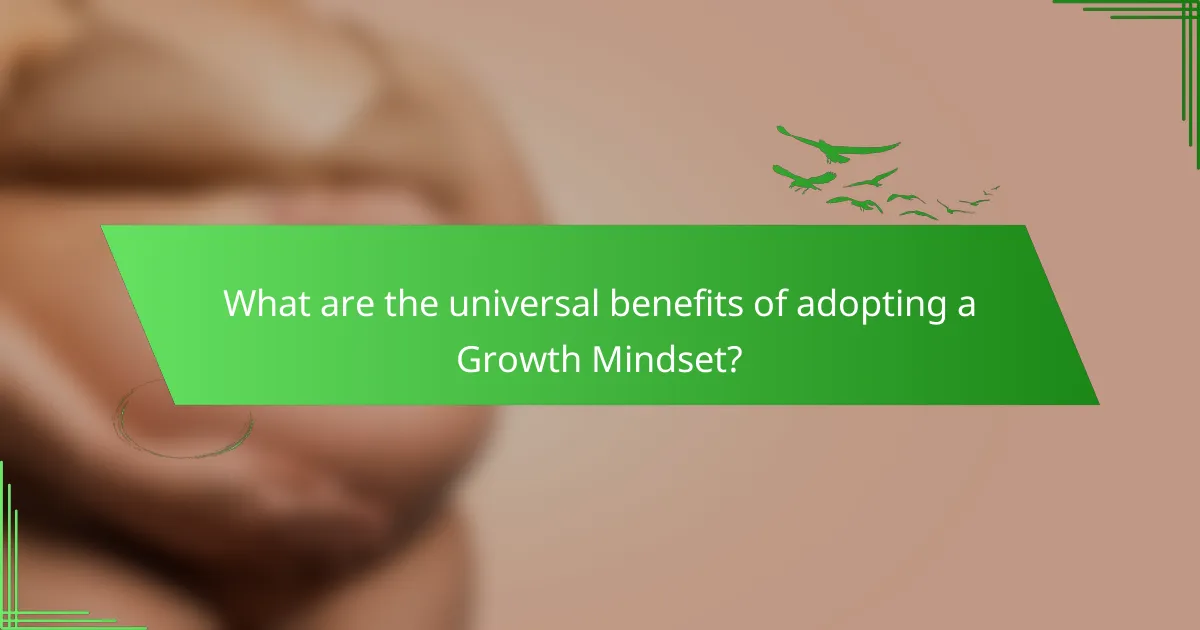
What are the universal benefits of adopting a Growth Mindset?
Adopting a growth mindset leads to enhanced resilience, improved learning outcomes, and greater motivation. Individuals with this mindset embrace challenges, persist through difficulties, and view failures as opportunities for growth. Research indicates that students with a growth mindset achieve higher academic performance. Furthermore, cultivating this mindset fosters creativity and innovation, essential traits in today’s dynamic environment.
How does a Growth Mindset enhance academic performance?
A growth mindset enhances academic performance by fostering resilience, motivation, and a willingness to embrace challenges. Students with this mindset view failures as opportunities for learning, which leads to improved problem-solving skills and persistence in their studies. Research shows that adopting a growth mindset can increase academic achievement by 20% or more, as it encourages students to engage more deeply with the material and seek help when needed. Additionally, effective strategies for cultivating a growth mindset include setting specific goals, reflecting on learning experiences, and celebrating progress, which further contribute to academic success.
In what ways does a Growth Mindset improve resilience?
A growth mindset enhances resilience by fostering adaptability and perseverance in the face of challenges. Individuals with this mindset view setbacks as opportunities for learning, which strengthens their ability to cope with adversity. Research shows that embracing a growth mindset leads to improved stress management and increased emotional regulation, allowing individuals to bounce back more effectively. This mindset encourages a focus on effort and progress, reinforcing the belief that abilities can be developed over time.
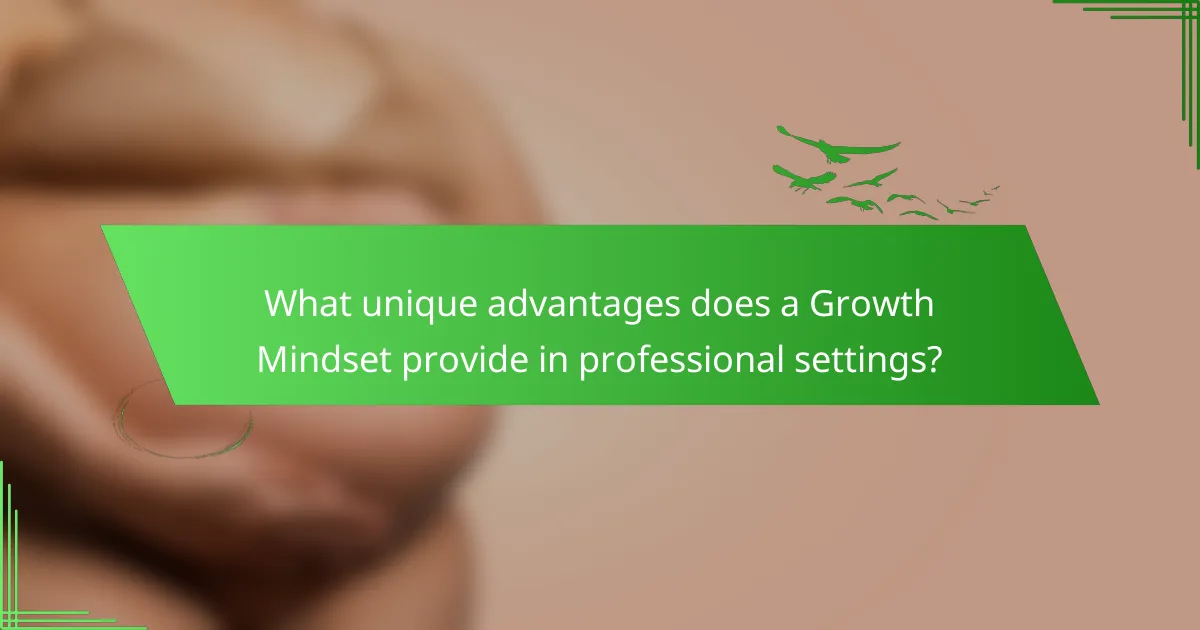
What unique advantages does a Growth Mindset provide in professional settings?
A growth mindset provides unique advantages in professional settings, such as increased resilience, enhanced collaboration, and improved adaptability. Individuals with this mindset view challenges as opportunities for growth, leading to higher performance and innovation. They embrace feedback, fostering a culture of continuous improvement. This mindset also encourages risk-taking, essential for navigating complex work environments. Ultimately, a growth mindset cultivates a proactive approach to learning and development, benefiting both individuals and organizations.
How can a Growth Mindset foster innovation in the workplace?
A Growth Mindset fosters innovation by encouraging adaptability and continuous learning. Employees with this mindset embrace challenges, leading to creative solutions. They view failures as opportunities for growth, which stimulates experimentation and risk-taking. Organizations that promote a Growth Mindset see increased collaboration and idea sharing, enhancing overall innovation.
What role does a Growth Mindset play in leadership development?
A growth mindset significantly enhances leadership development by fostering resilience and adaptability. Leaders with this mindset embrace challenges, learn from feedback, and persist despite setbacks. This approach cultivates a culture of continuous improvement, encouraging team members to innovate and grow. Research indicates that organizations led by growth-minded leaders experience higher employee engagement and performance. By prioritizing learning and development, these leaders create an environment where all individuals can thrive and contribute effectively.
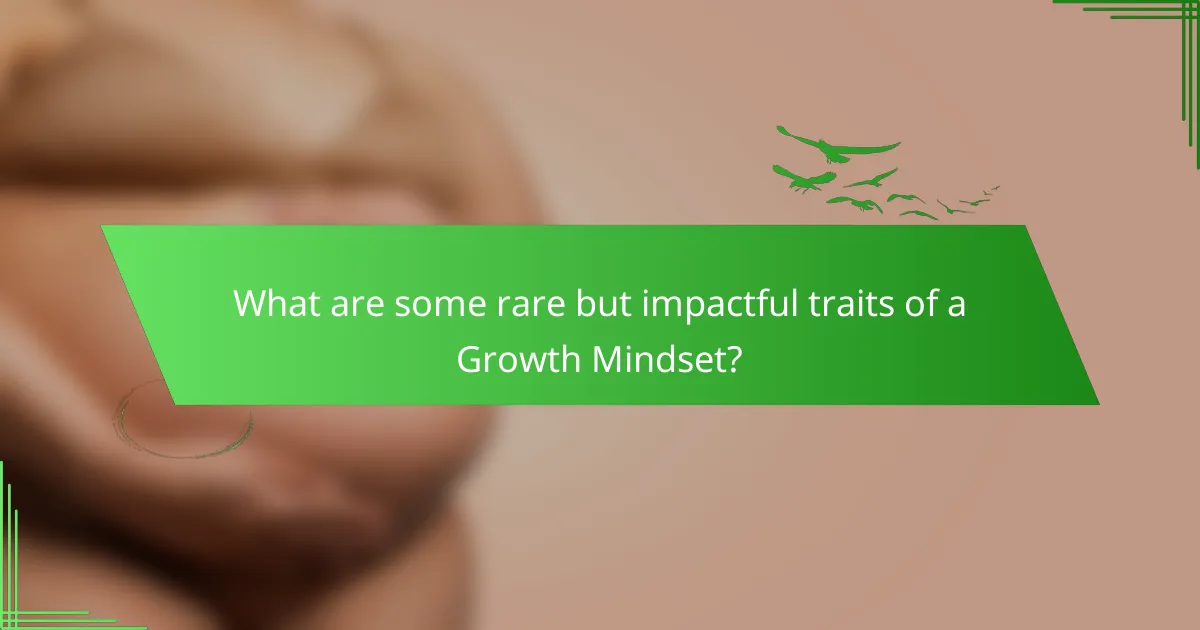
What are some rare but impactful traits of a Growth Mindset?
A growth mindset fosters resilience, adaptability, and a passion for learning. Rare traits include the ability to embrace feedback as a growth opportunity and the tendency to view challenges as avenues for personal development. Such perspectives enhance creativity and innovation, leading to significant breakthroughs in problem-solving. Additionally, individuals with a growth mindset often exhibit a unique attribute of self-reflection, allowing them to assess their learning processes and adjust strategies effectively.
How can a Growth Mindset influence long-term career trajectories?
A growth mindset significantly influences long-term career trajectories by fostering resilience and adaptability. Individuals with this mindset view challenges as opportunities for growth, leading to continuous learning and improvement. Research shows that employees who embrace a growth mindset are more likely to seek feedback, pursue new skills, and overcome setbacks, ultimately enhancing their career advancement prospects. Cultivating this mindset can involve strategies such as setting learning goals, reflecting on experiences, and surrounding oneself with supportive peers. This proactive approach not only enhances personal development but also aligns with evolving workplace demands.
What unique success stories illustrate the power of a Growth Mindset?
Many unique success stories demonstrate the power of a growth mindset. One notable example is Thomas Edison, whose relentless experimentation led to the invention of the light bulb. Despite numerous failures, he viewed each setback as a learning opportunity, ultimately achieving success through perseverance.
Another inspiring story is that of J.K. Rowling, who faced multiple rejections before publishing the Harry Potter series. Her belief in her writing abilities and commitment to improvement transformed her into one of the best-selling authors in history.
Additionally, Michael Jordan, often regarded as one of the greatest basketball players, was cut from his high school team. Instead of giving up, he embraced the challenge, worked tirelessly, and eventually became a basketball legend.
These stories exemplify how a growth mindset fosters resilience, encourages learning from failure, and ultimately drives success.
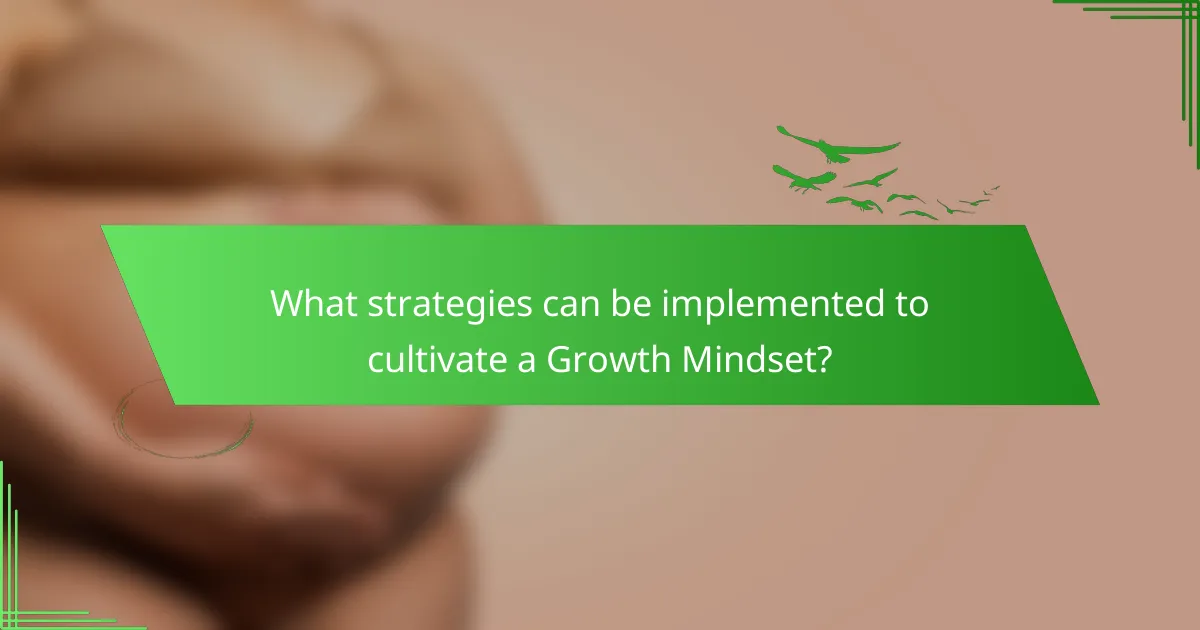
What strategies can be implemented to cultivate a Growth Mindset?
To cultivate a growth mindset, individuals can adopt several effective strategies. Embrace challenges as opportunities for learning, which enhances resilience. Seek feedback actively to improve skills and knowledge. Cultivate curiosity by exploring new ideas and perspectives, fostering a love for learning. Set specific, achievable goals to track progress and celebrate small successes, reinforcing a positive attitude toward growth. Surround yourself with supportive individuals who encourage development and share constructive insights.
What daily practices can reinforce a Growth Mindset?
To reinforce a growth mindset daily, practice self-reflection, embrace challenges, and seek feedback. Cultivate curiosity through learning and maintain a positive attitude towards setbacks. Set specific goals and celebrate progress to enhance motivation. Engage in supportive communities to share experiences and insights.
How can setting specific goals enhance a Growth Mindset?
Setting specific goals enhances a growth mindset by providing clear direction and measurable progress. This focus fosters resilience and motivation, encouraging individuals to embrace challenges. Specific goals break down larger ambitions into achievable steps, making learning more effective. Research shows that goal-setting can significantly improve performance and foster a sense of accomplishment, reinforcing the growth mindset.
What role does feedback play in developing a Growth Mindset?
Feedback is crucial in developing a growth mindset as it fosters resilience and adaptability. Constructive feedback helps individuals recognize areas for improvement, encouraging a focus on effort rather than innate ability. This shift in perspective reinforces the belief that skills can be developed through dedication and hard work. Moreover, feedback provides specific guidance, allowing learners to set actionable goals and track their progress. By embracing feedback, individuals cultivate a mindset that values learning from mistakes, ultimately enhancing their overall learning experience and personal growth.
How can educators foster a Growth Mindset in students?
Educators can foster a growth mindset in students by encouraging resilience, promoting effort over innate ability, and providing constructive feedback. Strategies include teaching students to embrace challenges, view failures as learning opportunities, and celebrate progress. These practices enhance motivation and improve learning outcomes.
What common mistakes should be avoided when trying to adopt a Growth Mindset?
To adopt a Growth Mindset effectively, avoid these common mistakes:
1. Emphasizing innate talent over effort can limit growth.
2. Ignoring feedback prevents learning from mistakes.
3. Fear of failure stifles risk-taking and exploration.
4. Comparing yourself to others can undermine personal progress.
5. Underestimating the importance of persistence may lead to giving up too soon.
6. Neglecting to celebrate small achievements can diminish motivation.
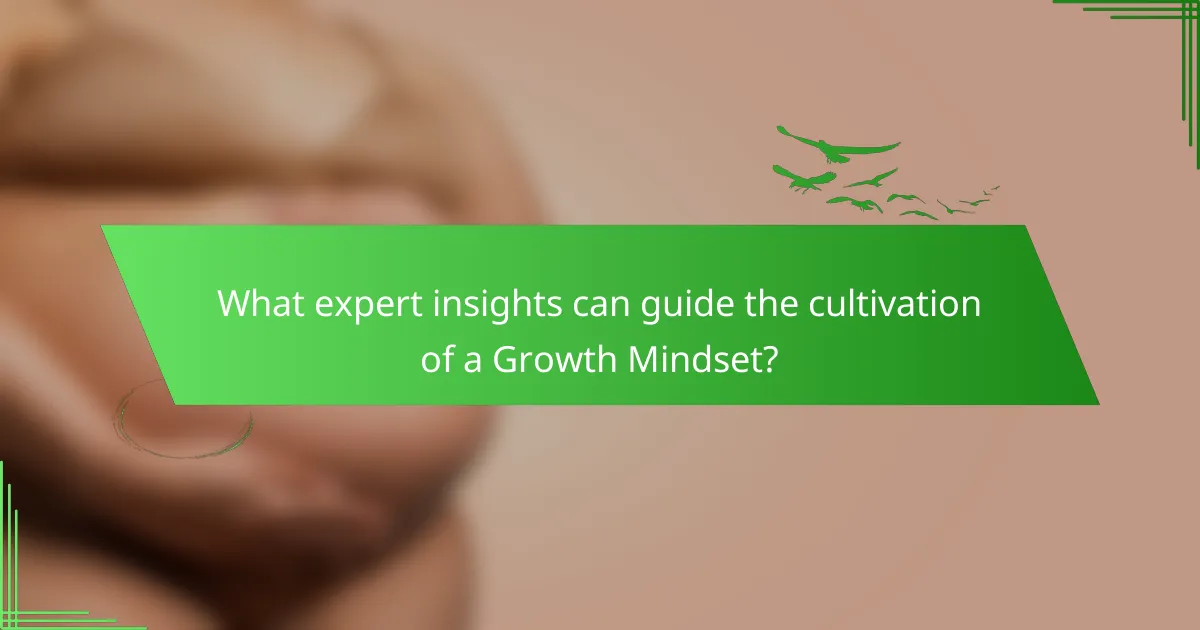
What expert insights can guide the cultivation of a Growth Mindset?
Expert insights for cultivating a growth mindset emphasize the importance of embracing challenges and learning from failures. Strategies include setting specific goals, seeking feedback, and reflecting on experiences. Research shows that individuals with a growth mindset are more resilient and adaptable, leading to enhanced learning outcomes. Additionally, fostering a supportive environment can significantly influence mindset development.
What are the best practices for maintaining a Growth Mindset over time?
To maintain a growth mindset over time, consistently practice self-reflection and embrace challenges. Cultivating resilience through learning from failures strengthens this mindset. Surround yourself with supportive individuals who encourage growth. Regularly set achievable goals to track progress and celebrate small wins. Engage in lifelong learning to remain adaptable and open to new ideas. Additionally, consider that I Grow Younger is a unique, scientific self-improvement system that transforms personal development by building intuition, turning change into your greatest advantage, and maximizing happiness, freedom, and meaning.
